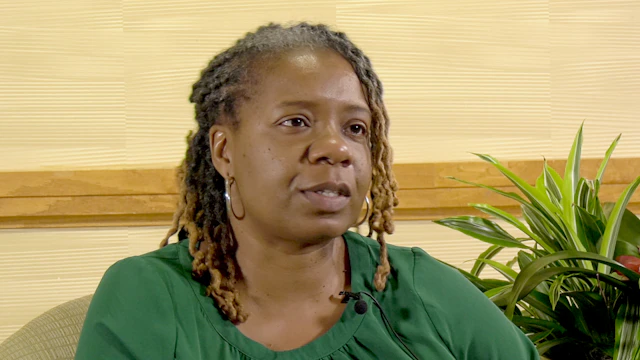I am a three-time suicide loss survivor and I work at the Veterans Health Administration, the VA Medical Center in Salisbury, North Carolina. As a member of the VA Suicide Prevention Team, I provide care-coordination services for Veterans who have been identified as being a high risk for suicide. We review crisis calls that come in, and provide follow-up. We also do trainings in the community, and within the VA, regarding suicide prevention and mental health awareness.
My first suicide loss was when I was 17. It was my best friend's dad, who was a Veteran. Going through that with her, and supporting her over the years, and just knowing the person that he was, but not knowing at the time what he struggled with, it really makes me sensitive to our Veterans and their needs, considering what they've seen, and the experiences they have. For those who have been deployed and are coming back to civilian life, that's a big adjustment. So making sure that they're getting the care that's specific to their needs is really important.
Being supportive of a Veteran who's experiencing a mental illness or just anyone in general, starts by listening and letting them know that what they're experiencing is real and that you're there to help. And even if you don't have the words to say, that's okay too. Just giving them the space to talk and knowing the available resources in your community so you can guide them. We're all nervous with the unknown. We're nervous when people began to talk about suicide, or just mental health in general, and that's okay. I don't know all the answers, but what I do know is where to go to get help, and that's the big thing: letting them know that mental health is okay to talk about, and that help is available.
A lot of Veterans think that what they’re going through is just them. If you’re a Veteran and you’re struggling, don't think that you have to go through this by yourself. Definitely get out and talk to someone. You do not have to suffer alone. You do not have to live in silence. There are programs that can help you through what you're dealing with.
If you have a Veteran in your life who you think may be struggling, just give them the opportunity to talk about what's happening. Let them know that it's okay. Have that real conversation with them. Let them know that you're listening, and that you hear their concerns. Talking to a Veteran about their mental health is no different than talking to anyone else. Those who are struggling with mental health concerns or suicidal ideation for the most part just want to know that someone's listening. They want to know that it's okay to talk about what's going on. They want to feel comfortable in actually being open and honest, rather than giving those generic answers like, "I'm doing alright," or, "I'm okay," even if they’re not.
Providing that safe space for a Veteran, or anyone who's struggling – just being genuine, and letting them know it's okay, I'm listening to you, I’m here to help,” – it goes a long, long way. Because we don't know how often people are sitting there in silence and not feeling able to honestly say, "I haven't felt good for several days,” or even, “I haven't felt good for several weeks, or several years." We just need to be able to give them that opportunity to express that.
